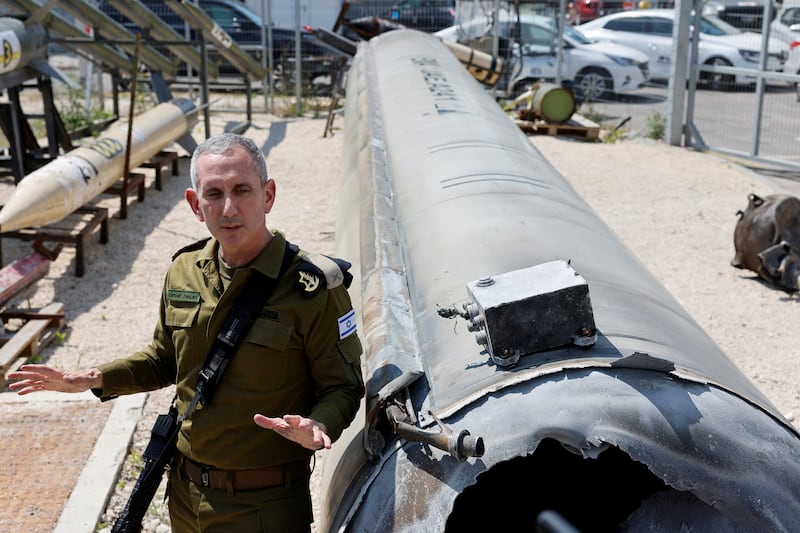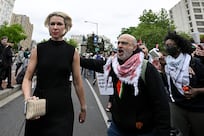Live updates: Follow the latest on Israel-Gaza
Iran and Israel are engaging in a dangerous “game of bluff” as the world braces for Israel's promised response to an Iranian missile and drone attack over the weekend which itself came after an Israeli strike against its Damascus embassy, analysts have told The National.
“We are in game of bluff in which it is in the interest of the two main players, Israel and Iran, to do the opposite of what they say and to say the opposite of what they do,” said Bertrand Badie, a leading French analyst on the Middle East.
Both sides have recently attained previously unreached thresholds in their decade-long proxy war.
Israel’s April 1 bombing of Iran’s embassy in Syria, which killed seven people, was unprecedented because it occurred on embassy soil, viewed in diplomatic terms as the equivalent of sovereign territory.
Iran’s retaliation on Saturday night is widely viewed as a face-saving exercise which was both escalatory and gave Tehran the opportunity to say it would not go further.
It was the first-ever attack on Israeli soil but Tehran also gave ample time to Israel and its allies to shoot down the hundreds of drones. The little that fell in Israel caused little physical damage and injured one child.
Israel's military has warned that it “will be met with a response” while its top diplomat Israel Katz has seized on signals of Western support to push ahead with a diplomatic offensive against Iran, calling for further sanctions.
“Iran seeks to demonstrate strength in a spectacular fashion while making sure they cause little damage likely to trigger a strong Israeli response,” said Mr Badie, professor emeritus at Sciences Po University in Paris.
“Israel consistently decries Iran’s attacks as life-threatening while also projecting invincibility. Meanwhile, the US says that Iran is serious but it would be even worse if the escalation continues.”
It's a dangerous game of contradictions that creates uncertainty and allows both parties to interpret the situation in a reassuring manner, said Prof Badie.
“The situation in the West Bank and Gaza will largely dictate how the situation evolves,” he said. Sources have also told The National that Iran is gearing up to counter an Israeli retaliation, possibly within its border.
More than to 34,800 people have died in the enclave in Israel's war of retaliation since the Hamas-led October 7 attacks that killed about 1,200 people.
Israel withdrew earlier this month from south Gaza for tactical reasons but has said that it is preparing a ground offensive on the southern city of Rafah, where 1.3 million people have found refuge from the fighting.
In parallel, the situation has steadily worsened in the occupied West Bank, where Israeli settlers protected by the army killed a teenager and injured dozens of Palestinians in a rampage on Sunday after the disappearance of an Israeli boy and the discovery of his body the following day. Israel has also increased targeted killings of Hezbollah and Hamas operatives in neighbouring Lebanon.
Israeli decision-makers may have decided that the response to the October 7 attacks represented a good pretext to dismantle Iran and its regional allies including Hezbollah and Hamas, but that is likely to cause never-ending escalation, warned Prof Badie.
“It is in Israel's interest to play the Iran card, for which there is minimal consensus, as long as it doesn't go too far in its strikes. On Gaza, Israel is officially alone, and we have seen rhetoric condemnation of the war from its US ally,” he said.
Prof Badie said “careful interpretation” was needed of continuing geopolitical tensions between Iran and Israel.
US, UK, French and Jordanian assistance, in addition to reports of support from other Arab countries, in destroying Iranian drones on Saturday does not imply, as media reports have claimed, a strategic realignment in the region or a new air-defence alliance, he added.
“It is a defensive reaction,” said Prof Badie. “The so-called Global South follows fluid diplomatic options that adapt to circumstances.”






